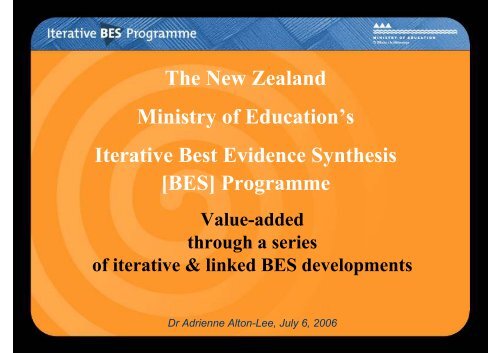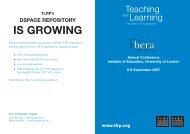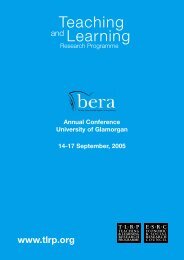Adrienne Alton-Lee (New Zealand) - Teaching and Learning ...
Adrienne Alton-Lee (New Zealand) - Teaching and Learning ...
Adrienne Alton-Lee (New Zealand) - Teaching and Learning ...
You also want an ePaper? Increase the reach of your titles
YUMPU automatically turns print PDFs into web optimized ePapers that Google loves.
The <strong>New</strong> <strong>Zeal<strong>and</strong></strong><br />
Ministry of Education’s<br />
Iterative Best Evidence Synthesis<br />
[BES] Programme<br />
Value-added<br />
through a series<br />
of iterative & linked BES developments<br />
Dr <strong>Adrienne</strong> <strong>Alton</strong>-<strong>Lee</strong>, July 6, 2006
Indicative evidence for the focus on family influences &<br />
the focus on teaching as a key system influence<br />
(30 multi-level modelling studies + previous lit reviews)<br />
Policy<br />
Leadership ?<br />
Developing a Health-of-the-System Framework<br />
Building a linked & interactive knowledge base<br />
across key areas of leverage
Turkey<br />
Between-school variation<br />
Within-school variation<br />
A shared challenge for<br />
Hungary<br />
Japan<br />
policy, research & practice<br />
Belgium<br />
Italy<br />
Germany<br />
Austria<br />
Netherl<strong>and</strong>s<br />
Czech Republic<br />
Korea<br />
Slovak Republic<br />
Greece<br />
Switzerl<strong>and</strong><br />
Between school variance<br />
Within school variance<br />
Luxembourg<br />
Portugal<br />
Mexico<br />
United States<br />
Australia<br />
<strong>New</strong> <strong>New</strong> <strong>Zeal<strong>and</strong></strong><br />
Spain<br />
Canada<br />
Irel<strong>and</strong><br />
Denmark<br />
Pol<strong>and</strong><br />
Building a<br />
shared national<br />
commitment to<br />
addressing the<br />
challenge<br />
Sweden<br />
Norway<br />
Finl<strong>and</strong><br />
Icel<strong>and</strong><br />
120 100 80 60 40 20 0 20 40 60 80 100 120<br />
Source : adapated from Figure 4.1 <strong>Learning</strong> for Tomorrow's World, OECD 2004,<br />
OECD PISA database, 2003. Table 4.1a
What works<br />
simultaneously?<br />
academic,<br />
social,<br />
& well-being<br />
outcomes<br />
Why, how<br />
& when?<br />
for diverse<br />
learners?<br />
www.minedu.govt.nz/goto/bestevidencesynthesis
Professor Allan Luke & David Hogan, Centre for Research on<br />
Pedagogy <strong>and</strong> Practice, Singapore (2006)<br />
World Yearbook of Education: Educational Research <strong>and</strong> Policy.<br />
What is distinctive about the <strong>New</strong> <strong>Zeal<strong>and</strong></strong><br />
approach is its willingness to consider all<br />
forms of research evidence regardless of<br />
methodological paradigms <strong>and</strong> ideological<br />
rectitude, <strong>and</strong> its concern in finding<br />
contextually effective, appropriate <strong>and</strong> locally<br />
powerful examples of “what works”. Its focus<br />
is on capturing <strong>and</strong> examining the impact of<br />
local contextual variables (e.g., population,<br />
school, community, linguistic <strong>and</strong> cultural<br />
variables).
Bodies of evidence’ – interlinked & updating<br />
Not prescriptive – creates underst<strong>and</strong>ings & conjectures<br />
Theoretical coherence – theory as a tool to inform<br />
infinitely creative educational practice <strong>and</strong> ever-changing<br />
contexts<br />
Complexity exemplified via case studies<br />
Not ‘best’ available – BES names gaps & proposes<br />
evidence-based processes<br />
Iterative – each BES an iteration inviting further research<br />
<strong>and</strong> development in NZ to feed into future BES iterations
Current status of 1 st & 2 nd iterations<br />
2 nd iterations in progress<br />
Professional<br />
Development<br />
ECE (1)<br />
Educational<br />
Leadership<br />
Schooling (2)<br />
Professional<br />
<strong>Learning</strong> & Dev<br />
Schooling (2)<br />
Quality teaching<br />
ECE (1)<br />
Family &<br />
Community<br />
Influences (1)<br />
Quality teaching for<br />
diverse learners<br />
Schooling (1)<br />
Quality teaching<br />
social studies<br />
social sciences (2)<br />
Quality teaching<br />
mathematics (2)
Dialogue about educational research, policy, <strong>and</strong> practice:<br />
To what extent is it possible <strong>and</strong> who should be involved?<br />
Dialogue isn’t necessarily more efficient, but it’s more<br />
democratic <strong>and</strong>, therefore, more effective.<br />
…Our preference is also based on the belief that in the<br />
long run dialogue <strong>and</strong> participation by a wide range of<br />
stakeholders produce better <strong>and</strong> more relevant<br />
educational research, policy <strong>and</strong> practice. …Certainly, it<br />
may be easier – <strong>and</strong>, in that sense, more efficient – for<br />
researchers, policy makers, <strong>and</strong> practitioners in<br />
education to engage in action (or even in praxis) in<br />
isolation of members of the other groups.
However, the decisions that are made <strong>and</strong> the actions that<br />
are pursued are likely to be less effective. This is the case<br />
not only because the quality of judgments may be lower but<br />
also because the activities of one group may detract from<br />
or cancel out those of other groups.‘ (p. x)<br />
Ginsburg, M., & Gorostiaga, J. (2003).<br />
Limitations <strong>and</strong> possibilities of dialogue among<br />
researchers, policy makers <strong>and</strong> practitioners: International<br />
perspectives on the field of education.
Agreed National Guidelines for Development of a<br />
series of Projects - 3 national advisory groups<br />
• Tool to guide policy, research & practice collaboration around<br />
BES development<br />
• High level Ministry of Education agreement<br />
• Ongoing formative quality assurance of both BES<br />
developments & Guidelines<br />
– Many contributors to formative quality assurance<br />
• Model for continuous improvement
Professor Paul Cobb V<strong>and</strong>erbilt University<br />
winner of Hans Freudenthal medal winner 2005<br />
Formative QA Report – Mathematics BES<br />
The Formative Quality Assessment Seminar held in Auckl<strong>and</strong> on<br />
February 13, 2006 exemplified transparency <strong>and</strong> provided an<br />
opportunity for members of a wide range of constituencies to present<br />
<strong>and</strong> debate their views.<br />
The BES Guidelines are outst<strong>and</strong>ing <strong>and</strong> are clearly grounded in the<br />
hard-won experience of synthesizing research findings to inform both<br />
policy <strong>and</strong> practice. Strengths of the Guidelines include…<br />
– The mature view of evidence apparent in the call for theoretical<br />
pluralism <strong>and</strong> methodological pluralism.<br />
– The consistent call for attention to issues of language <strong>and</strong> culture.<br />
– The consistent call for attention to the worth of explanatory theories,<br />
including explanatory coherence.
Ongoing formative evaluation of<br />
both syntheses & the programme<br />
• Cobb’s advice: Guidelines need<br />
– More guidance re multiple audiences<br />
– Better distinctions between causality claims<br />
– Exemplification of Health-of-the-System Framework &<br />
systemic analysis<br />
– More consistency in ‘Responsiveness to Diversity<br />
Framework’ & attention to the fluidity <strong>and</strong> complexity of<br />
individual identity<br />
• Each international quality assurer & advisor assisting with<br />
development e.g. Professor Jere Brophy,<br />
Dr Lorna Earl, Professor Allan Luke
Teacher Union Ownership - Judie Alison, Advisory Officer<br />
(Professional Issues) PPTA (Teacher Union) 23 February 2006<br />
PPTA regards itself as a partner in the BES programme. As the policy<br />
adviser at PPTA specialising in professional issues, I have been closely<br />
involved with the Best Evidence Synthesis work ever since 2003.<br />
I have served on the advisory groups for the BES on Maths,<br />
Pangarau/Social Studies, Professional <strong>Learning</strong> <strong>and</strong> Leadership.<br />
We also have a number of PPTA members involved in various ways on<br />
reference groups or serving as advisers or quality assurers for the projects.<br />
The President <strong>and</strong> I were involved in developing strategy around the launch<br />
of the <strong>Alton</strong>-<strong>Lee</strong> <strong>and</strong> Biddulph BES work in 2003.<br />
I was part of the reference group which developed the Guidelines.
Judie Alison, Advisory Officer<br />
(Professional Issues) PPTA 23 February 2006<br />
I believe that the BES programme is absolutely committed to<br />
promoting social justice, <strong>and</strong> for that reason our union, like<br />
NZEI, has committed itself to working alongside this research<br />
programme. The whole diversity framework that is an intrinsic<br />
part of BES (see the Guidelines) guides our thinking <strong>and</strong> our<br />
critiquing of work in progress, <strong>and</strong> the analysis of diversity that<br />
is being used is a very sophisticated <strong>and</strong> sensitive model light<br />
years away from the concept of diversity reflected in much<br />
other research work. Ensuring that teaching addresses issues<br />
of diversity is fundamental to promoting social justice in<br />
education.
• BES developments – linked & interactive – attract resources<br />
• Raises quality across projects<br />
Added – value?<br />
• Makes transparent a process of building policy knowledge –<br />
less able to be embargoed<br />
• Counters siloing of educational research – national<br />
collaboration occurring across educational researchers, across<br />
universities across teacher education, <strong>and</strong> across practice<br />
• Positions research value differently – using triangulation <strong>and</strong><br />
BES methodology one study can inform many aspects of policy<br />
• Builds underst<strong>and</strong>ing across indigenous perspectives –<br />
enriches whole knowledge base<br />
• Increases dem<strong>and</strong> for knowledge<br />
• Builds cohesive knowledge base without sacrificing complexity<br />
–
Added – value?<br />
• Partnerships across policy, research <strong>and</strong> practice provide focal<br />
point for vigorous debate <strong>and</strong> ongoing communication <strong>and</strong><br />
contestation – informed by evidence >shared language<br />
• Develops a professional community >commitment to<br />
addressing a shared challenge in education >builds pressure<br />
for the issues arising to be addressed<br />
• Getting everyone more focussed on diverse learners & a range<br />
of valued outcomes – academic, social <strong>and</strong> cultural identity<br />
• Focuses researchers on teachers as audience & policy as<br />
audience – orientation to making a positive difference<br />
• Cumulative effect of a series of BESs – building receptiveness<br />
in policy, research, schools, teachers & teacher educators
Being Wary of Magical Thinking about<br />
Evidence-Based Knowledge Development<br />
• BES as a catalyst for Research & Development – the ‘Living<br />
BES’<br />
• Developing the conditions for use of BES consistent with<br />
findings of BESs e.g.<br />
– evidence about impact of research on practice<br />
– evidence about conditions supporting teacher learning<br />
– trialling teacher responses to case studies for cognitive<br />
load, learning & preference)<br />
• Evaluation Strategy for BES - Dr Lorna Earl assisting<br />
• Iterative approach is key to value add

















